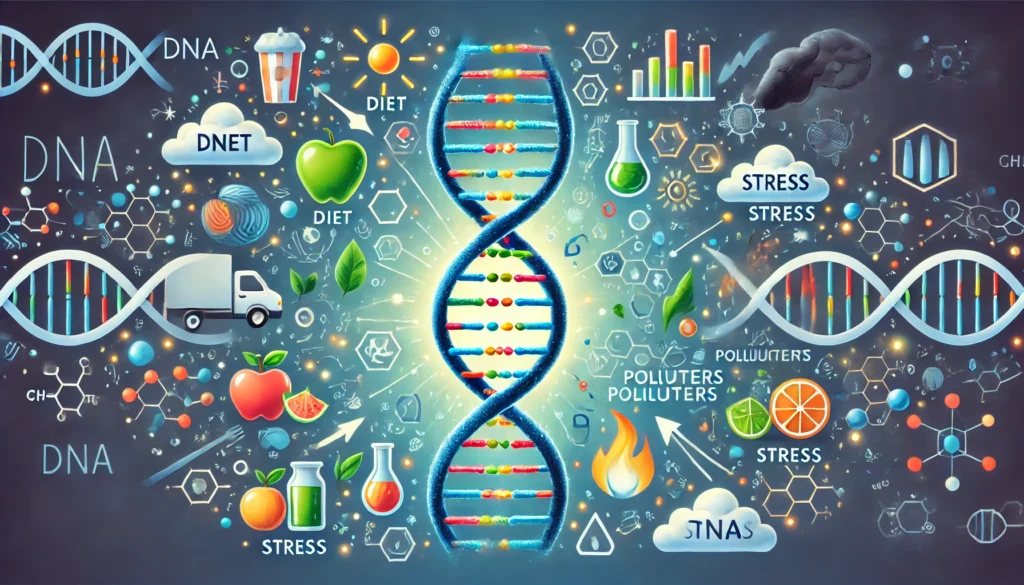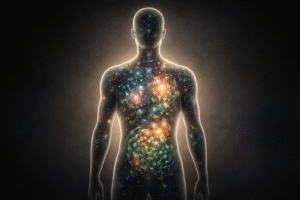In recent years, scientists and health professionals alike have been intrigued by a fascinating question: Why do identical twins, who share the same genetic code, sometimes develop different traits or health conditions? The answer lies in gene expression, influenced by environmental factors. This blog will explore how our surroundings can affect the way our genes work, shaping everything from our physical traits to our health outcomes.
Introduction
When we think about genetics, it’s easy to imagine that our DNA is the blueprint that strictly dictates everything about us. But the truth is more nuanced. While our genes lay out the blueprint, the environment significantly influences how these genetic instructions are implemented. This process is known as gene expression—how certain genes are turned on or off—and is influenced by various environmental factors like diet, stress, and exposure to chemicals. The role of environmental factors in gene expression is a dynamic and fascinating aspect of biology that helps explain many variations in human traits and behaviours.
The Basics: What is Gene Expression?
Before diving into the environmental factors, let’s understand gene expression a little better. Simply put, gene expression is the process by which information from a gene is used to create proteins, which then perform various functions in the body. Not all genes are active all the time. Some are expressed only in certain tissues or at particular times. For example, the genes responsible for insulin production are active in the pancreas, while those regulating vision are more active in the retina. This selective activation is vital for the body’s functioning.

Environmental Factors That Influence Gene Expression
Now, let’s talk about the real game-changers: the environmental factors. Several elements from our environment have the power to influence which genes are activated or deactivated in our bodies. Here are some of the most common factors:
Diet: You Are What You Eat (Literally!)
Food doesn’t just provide energy; it can alter gene expression. Specific nutrients and compounds in our food interact with our DNA. For instance, folic acid, a vitamin found in leafy greens, can modify the expression of genes linked to neural development in babies. Omega-3 fatty acids, commonly found in fish, influence genes involved in reducing inflammation.
Case study: Studies indicate that people who adhere to a Mediterranean diet, abundant in fruits, vegetables, and healthy fats, exhibit modified gene expression patterns, which correlate with a reduced risk of heart disease and type 2 diabetes.
Stress: A Silent Modifier
Ever noticed how prolonged stress can affect your health? Stress can actually cause changes in gene expression, especially related to immune response, inflammation, and even mental health. Stress hormones like cortisol can interact with specific genes, causing them to switch on or off. This may explain why chronic stress is linked to conditions like anxiety, depression, and even certain cancers.
Anecdote: There’s an interesting phenomenon observed in Holocaust survivors and their descendants. Studies suggest that the severe stress experienced by survivors caused gene expression changes that were passed down, increasing susceptibility to post-traumatic stress disorder (PTSD) in their children.
Toxins and Chemicals: Unwelcome Guests
Exposure to pollutants, toxins, and chemicals in the environment can wreak havoc on gene expression. Cigarette smoke, for example, contains chemicals that modify genes related to lung function, leading to an increased risk of lung cancer. Pesticides and industrial chemicals can interfere with gene regulation, potentially causing various health problems, from hormonal imbalances to reproductive issues.
Case study: A study conducted in Delhi showed that children exposed to high levels of air pollution had altered gene expression in their respiratory systems, making them more prone to asthma and bronchitis.
Physical Activity: Moving Toward Better Gene Health
Exercise isn’t just good for your muscles—it can change the way your genes function. Regular physical activity has been shown to modify genes involved in fat metabolism, insulin sensitivity, and inflammation. These changes help reduce the risk of chronic diseases like diabetes, heart disease, and obesity.
Anecdote: In a fascinating experiment, identical twins were studied—one twin was sedentary while the other exercised regularly. Over time, their gene expression patterns differed, with the physically active twin showing healthier gene profiles linked to metabolism and inflammation.
Temperature and Climate: Weathering the Change
Believe it or not, even the weather can impact gene expression. Cold temperatures trigger the activation of genes that regulate the production of heat in our bodies, a process called thermogenesis. On the other hand, prolonged exposure to hot environments can activate genes responsible for cooling mechanisms, like sweating.
Example: Animals living in colder climates have evolved to express genes that enable them to grow thicker fur or store more fat during colder months, adapting to survive in harsher conditions.
Social and Psychological Environment: Beyond the Physical
Our emotional well-being and social interactions can also influence gene expression. Studies show that individuals with strong social connections have better immune function, possibly due to the positive influence of their social environment on genes related to immune response. Similarly, people in negative social environments, such as those experiencing loneliness or bullying, often have suppressed gene expression in immune-related genes.
Epigenetics: The Link Between Environment and Genes
The field of epigenetics has revolutionized our understanding of how environmental factors influence gene expression. Epigenetics involves changes in how genes are expressed without altering the actual DNA sequence itself. Think of it as a software update for your genes—the hardware remains the same, but the way it functions changes.
One of the most well-known epigenetic processes is DNA methylation, where chemical compounds called methyl groups attach to DNA and either suppress or enhance gene expression. Factors like diet, stress, and exposure to environmental toxins can impact DNA methylation, which can influence your health and potentially be inherited by future generations.
Real-Life Implications of Environmental Gene Expression
The concept that environmental factors can alter gene expression has far-reaching implications in medicine, agriculture, and even social policy. For instance, understanding how diet influences gene expression can lead to personalized nutrition plans tailored to an individual’s genetic makeup. This can prevent or treat chronic conditions such as obesity, diabetes, and heart disease more effectively.
Additionally, recognizing how pollution affects gene expression can push governments to implement stricter environmental regulations. It can also encourage individuals to make more eco-friendly choices, knowing that their environment affects not only their own health but potentially that of future generations.
Conclusion: You Can Influence Your Genes!
The idea that we have some control over our gene expression through environmental factors is empowering. While we can’t change our DNA, we can influence how our genes are expressed by making conscious choices about our diet, physical activity, stress management, and even the social environments we immerse ourselves in. Environmental factors play a significant role in gene expression, shaping not only who we are but also how we can lead healthier, more fulfilling lives.
As science progresses, we’ll continue to uncover the fascinating ways in which our environment and genes interact, giving us even more tools to live healthier and happier lives.
Author’s Note:
Understanding the role of environmental factors in gene expression can empower us to take better care of our health. We can’t always control our environment, but the choices we make daily can have lasting impacts on our well-being and even the well-being of future generations.
G.C., Ecosociosphere contributor.
References and Further Reading:
- National Institutes of Health – Epigenetics
- Harvard T.H. Chan School of Public Health – The Nutrition Source: Gene-Diet Interaction
- Understanding Genetic Information: What You Need to Know. https://scienceofbiogenetics.com/articles/understanding-genetic-information-an-in-depth-look-into-the-building-blocks-of-life
- Factors influencing gene expression and activation. https://scienceofbiogenetics.com/articles/understanding-the-mechanisms-behind-gene-expression-unraveling-the-complex-interplay-that-triggers-genetic-activity
- Epigenetics & Aging — Everything You Need to Know – Health Quest 365. https://healthquest365.com/blogs/blogs-posts/epigenetics-and-aging-everything-you-need-to-know
- Factors influencing gene expression and activation. https://scienceofbiogenetics.com/articles/understanding-the-mechanisms-behind-gene-expression-unraveling-the-complex-interplay-that-triggers-genetic-activity
- Can Environmental Factors Change Genes?. https://www.findingasuitable.com/can-environmental-factors-change-genes/




